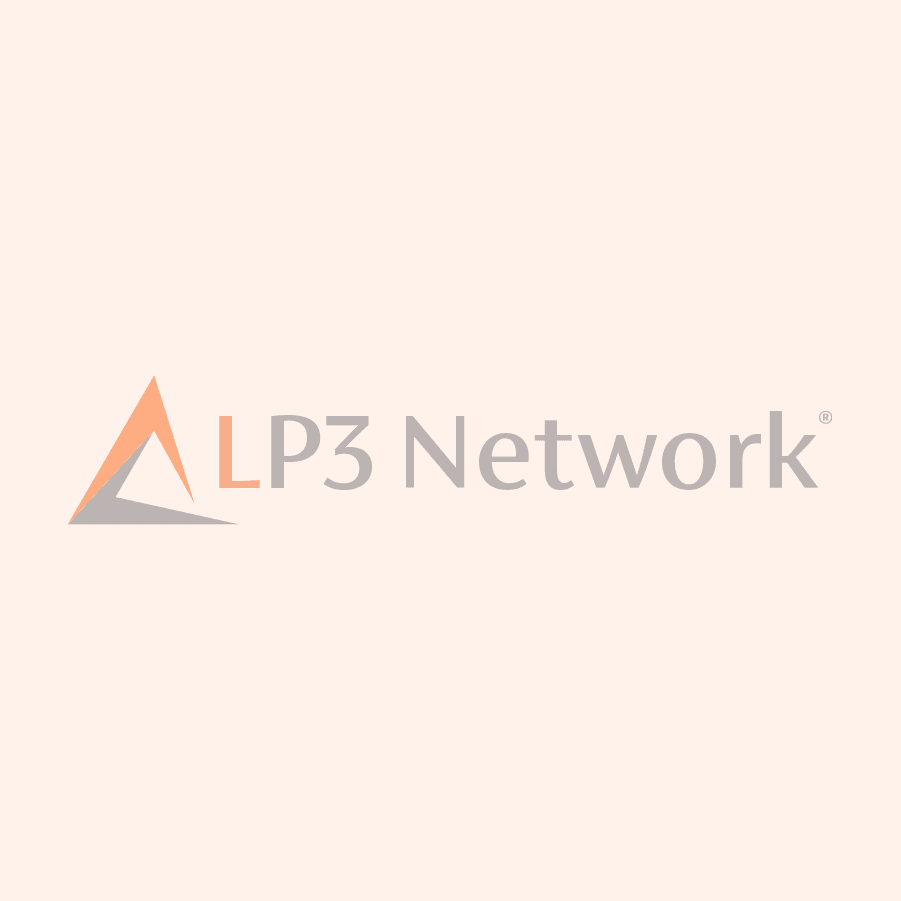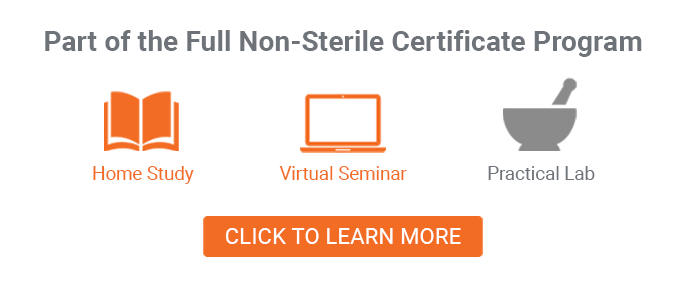
The Science of Pharmaceutical Compounding: Non-sterile Training | Seminar
This two-day live virtual event provides foundational training on non-sterile compounding - everything from business basics, to scientific principles such as dosage form stability and suitability, to performing pharmaceutical calculations, to implementing regulatory guidelines, standards of practice, SOPs, and much more.
Course description
The seminar will cover four subsections:
- Business Basics highlights the importance for a compounding practice to build a unique identity and deliver consistent marketing messages. Participants will construct, assess, rehearse, and deliver marketing messages through written and verbal communication. Business Basics also explores financial management as the participant reviews start-up costs, acquisition costs and expenditures, selling prices, forecasted growth and expectations, and revenue stream generators. A two-year financial plan spreadsheet identifies cornerstones and milestones for the new and expanding compounding practice.
- Creating a Culture of Quality features implementation methods for regulatory guidelines, standards of practice, and standard operating procedures. Participants will learn how to establish a comprehensive action plan and documentation practices related to all aspects of a compounding practice.
- Compounding Calculations provides the participant the opportunity to learn and practice common pharmacy calculations, including, interpreting drug monographs, drug conversions, drug strength adjustments applying the certificate of analysis, capsule calculations, displacement calculations, stock concentrates and aliquots for powder blends and powder-in-liquid mixtures, among more.
- Scientific Principles teaches the participant how to ensure dosage form stability and suitability for the patient. The participant will learn to compound a medication by modifying its route of delivery and/or delivery system while optimizing drug bioavailability, patient safety and positive therapeutic outcomes. Scientific Principles also provides the participant the opportunity to apply a number of core concepts by assessing a series of clinical cases. It concludes with a comprehensive method for prescription assessment and clinical decision-making, both critical to a successful compounding practice.
Course format
Home Study (24 hours) pre-read that reviews fundamental concepts in non-sterile compounding to prepare you for the live event. To review the full activity description for the Home Study click here.
Two-day Live Virtual Seminar (12 hours) that allows you to connect and interact online, in real time, through open mic Q&A sessions, group discussions, polls, and online chats.
The live stream will take place according to Eastern Standard Time (EST).
Day one & two - 10:00am to 5:00pm EST
Combine this program with the Non-Sterile Training: Practical Lab, where you will develop hands-on, application-based compounding skills, and prepare eight non-sterile common dosage forms to complete the full Certificate Program.*
Instructional design
This seminar is a highly interactive application-based program that strikes a careful balance between a patient-centric and business-centric approach for the learner. Facilitators complement the program by bringing a wealth of personal and professional expertise to the learner’s experience in these two approaches. The program concludes with a learning assessment, which provides feedback to the learner.
Intended audience
- Pharmacists, Pharmacy Technicians, Pharmacy Managers, Designated persons in positions of responsibility, and Quality Assurance & Quality Control officers looking to advance their practical non-sterile compounding skills related to any professional setting.
- Auditors / Inspectors looking to hone their assessment skills in concert with the standards described and detailed in this Activity.
Learning objectives
Pharmacists
- Assess, write and construct marketing messages and material.
- Practice delivering a unique marketing message through verbal communication.
- Evaluate a two-year financial spreadsheet for a non-hazardous and hazardous compounding practice.
- Assess acquisition costs and establish the selling price of compounded medications.
- Summarize regulatory guidelines and standards of practice for compounding.
- Demonstrate how to customize standard operating procedures.
- Compare standards of practice for non-hazardous to hazardous drug compounding.
- Design a collaborative compounding practice.
- Relate standards of practice and workflow dynamics to facility design models.
- Relate standard operating procedure competency and compliance with corrective action and preventive action.
- Demonstrate compounding calculations to increase accuracy and minimize medication error.
- Discover how to balance dosage form stability with the suitability of a compounded medication for a patient.
- Apply the concept of customization with appropriate compromise to a compounded medication.
- Relate dosage form design to bioavailability optimization, patient safety and a positive therapeutic outcome.
- Summarize the importance of the steps of a prescription assessment for compounding.
- Explain the importance of clinical decision-making processes in compounding.
Pharmacy technicians
- Assess, write and construct marketing messages and material.
- Practice delivering a unique marketing message through verbal communication.
- Describe a two-year financial spreadsheet for a non-hazardous and hazardous compounding practice.
- Compute acquisition costs and establish the selling price of compounded medications.
- Summarize regulatory guidelines and standards of practice for compounding.
- Demonstrate how to customize standard operating procedures.
- Apply standards of practice for non-hazardous and hazardous drug compounding.
- Explain a collaborative compounding practice.
- Relate standards of practice and workflow dynamics to facility design models.
- Relate standard operating procedure competency and compliance with corrective action and preventive action.
- Solve compounding calculations to increase accuracy and minimize medication error.
- Demonstrate the importance of dosage form stability with the suitability of a compounded medication for a patient.
- Explain the concept of customization with appropriate compromise as it applies to a compounded medication.
- Describe dosage form design as it relates to bioavailability optimization, patient safety and a positive therapeutic outcome.
- Recognize the importance of the steps of a prescription assessment for compounding.
- Recognize the importance of clinical decision-making processes in compounding.
Hardware/software requirements
We will be using Zoom for this Virtual Seminar. We recommend joining from a desktop or laptop computer - full system requirements can be found here. You can download the Zoom client here.
If you will be joining from a tablet or mobile device, check out the system requirements here. More information: Getting started on Android and iOS.
| Web browser |
|
||
|
Internet connection |
|
||
|
Misc |
|
||
|
Hardware |
Minimum | Recommended | |
| Processor | Single-core 1Ghz or higher | Dual-core 2Ghz or higher (Intel i3/i5/i7 or AMD equivalent) | |
| RAM | N/A | 4 GB | |
Testimonials
"The greatest aspect of the training that LP3 Network offers is the instructors that teach these courses. At my Non-sterile training, I was excited to have Mark Filosi as the main instructor. Mark is a self-made, well-established compounder that has the experience and skills needed to run his own compounding pharmacy, which he has been doing for years. Together, with the other facilitators, they make up a team that is at the forefront of compounding, teaching you how to compound beyond regulation standards.”
Kyle Dolan | Pharmacist, Missouri
“From my initial contact with the LP3 Network staff, to getting signed up, to the accommodations, to the actual quality of the course, everything was top notch. The information was presented in a non-biased way and there was a good balance of lecture and hands-on lab work when paired with the lab training. The training supports development as a compounder, giving you not only the information you need to compound, but the standard you should strive to uphold. One of the best aspects of the course was how supportive the instructors were. The lecturers make the course fun, interesting and do a great job making difficult topics enjoyable. The material is presented in such a way as to make the theoretical information usable in everyday practice. I feel compounding is the future of pharmacy and this course does a wonderful job at introducing the topic. It is also a great place to network and meet people from all over with different background. I will definitely take more courses in the future with LP3 Network.”
Cathleen Gerhardt | Pharmacist
“This program was very straight to the point. I feel that it gave me the confidence and knowledge necessary to start marketing my compounding business. Everyone involved in the course was very patient and friendly. No matter how good you are, the instructors can still add to what you already know. I strongly recommend it.”
Kyro Nagib | Pharmacist, South Carolina
Promotional video
Financial support
This learning activity has received financial support from MEDISCA Inc. in the form of an educational grant.
Copyright
This CE Activity is Copyright © 2002-2024 LP3 Network.
*Composed of three components – the Home Study, the Virtual Seminar (includes the Home Study), and the Practical Lab– the Certificate Program provides pharmacists and pharmacy technicians with a well-rounded, comprehensive, practical, and applicable understanding of non-sterile compounding – everything from foundations in pharmaceutical compounding, to regulations and standards of practice, to business and marketing, to quality control, to the hands-on preparation of non-sterile dosage forms, and much more. Each program has an associated learning assessment that must be successfully completed to fulfill the requirements of the full Certificate Program. The Virtual Seminar and Practical Lab must be taken within 6 months of each other. Upon successful completion of the full Certificate Program, participants will receive a certificate of completion acknowledging their achievement that can proudly be displayed in their compounding pharmacy.
